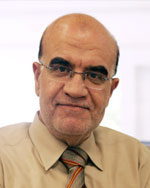WCMC-Q Physician Working with HMC to Target Genetic Disorders
Sept 2009

Dr. Ahmad Teebi
Qatar’s newborn screening program—a collaboration between Hamad Medical Corporation and Heidelberg University, Germany—is just the first of many being unveiled as services through Hamad Medical Corporation’s Genetic and Genomic Program. Having worked with HMC for more than a decade, Dr. Ahmad Teebi, professor of pediatrics and genetic medicine at WCMC-Q, has been on the genetic center’s planning committee since its inception.
“We aim to involve all genetic experts in the country in the operation of this facility so that they can they can work together as a unit, and everyone can benefit from this,” Dr. Teebi said.
For years, health centers around the world have been screening newborn babies for genetic disorders. But very few have been part of a national effort to screen every newborn for around 35 genetic disorders each.
“This screening program has been in operation for many people in the states for 25 years—with variable coverage. Some centers may screen for two, three, five diseases, but one or two screen for this large of a number,” Dr. Teebi said.
Another program that is about to launch through the center involves genetic testing for all couples who plan to marry. Through HMC’s premarital counseling and testing program, people will be screened for both communicable disorders—like HIV and hepatitis—and genetic disorders—like spinal muscular atrophy or cystic fibrosis. While this kind of testing has been done in Qatar on a limited scale, this program, Teebi said, will make it a legal step in the process of getting married in Qatar.
Consultation clinics will soon be unveiled through HMC as well. These will operate as referral facilities to which anyone suspected of having a genetic disease is sent for expert consultation and treatment, Teebi said. He also foresees specialty clinics.
“These would be clinics that have very specific specializations—say for example, clinics for genetic deafness, craniofacial clinics, clinics for Down Syndrome, etc.,” he said.
As these forms of screening and treatment become available, the need for counselors will increase. Dr. Teebi hopes to bring talent from the United States and other regions where counseling is more prevalent. At the same time, he hopes counselors will be fluent in Arabic and sensitive to the local culture and is behind training programs designed for locals to become counselors.
Although the Qatar Medical Genetic Center—located in Hamad Medical City, building 21—is not yet fully operational, it is open for referrals and special cases.
